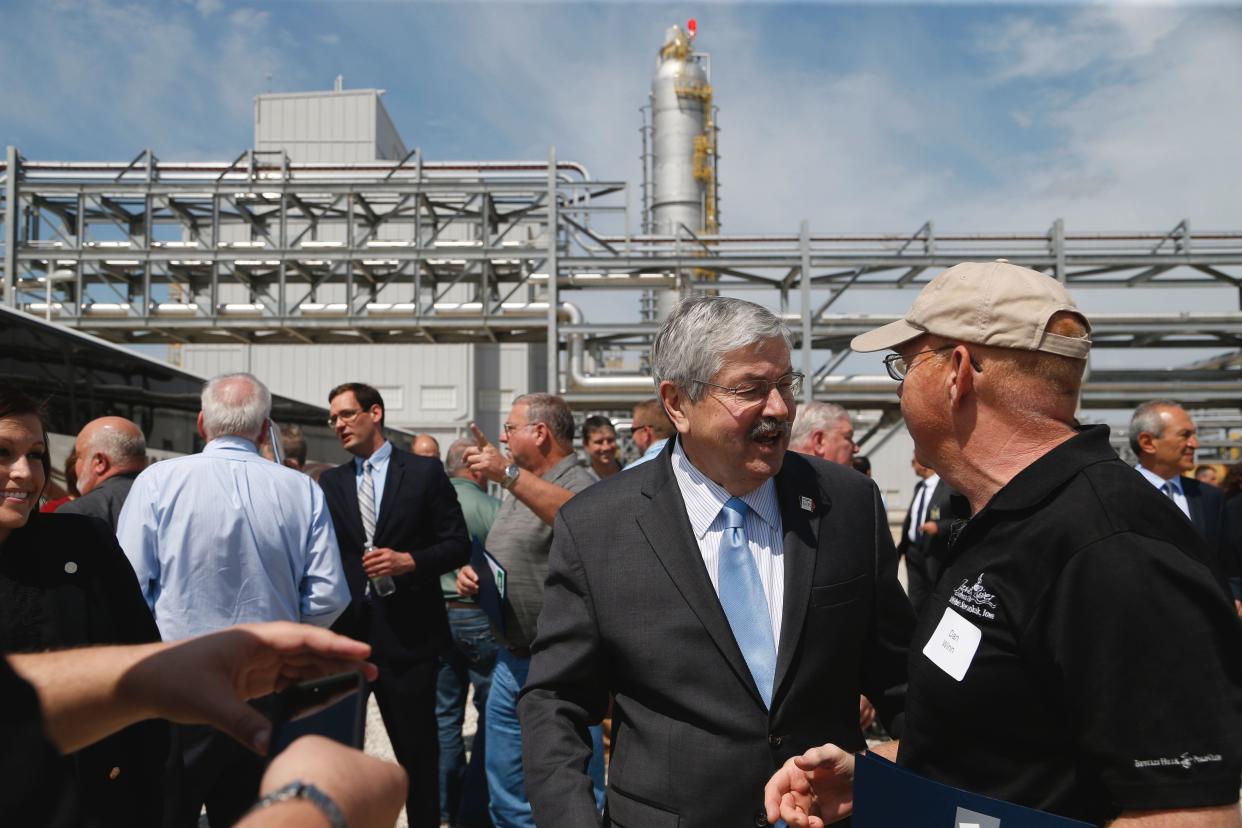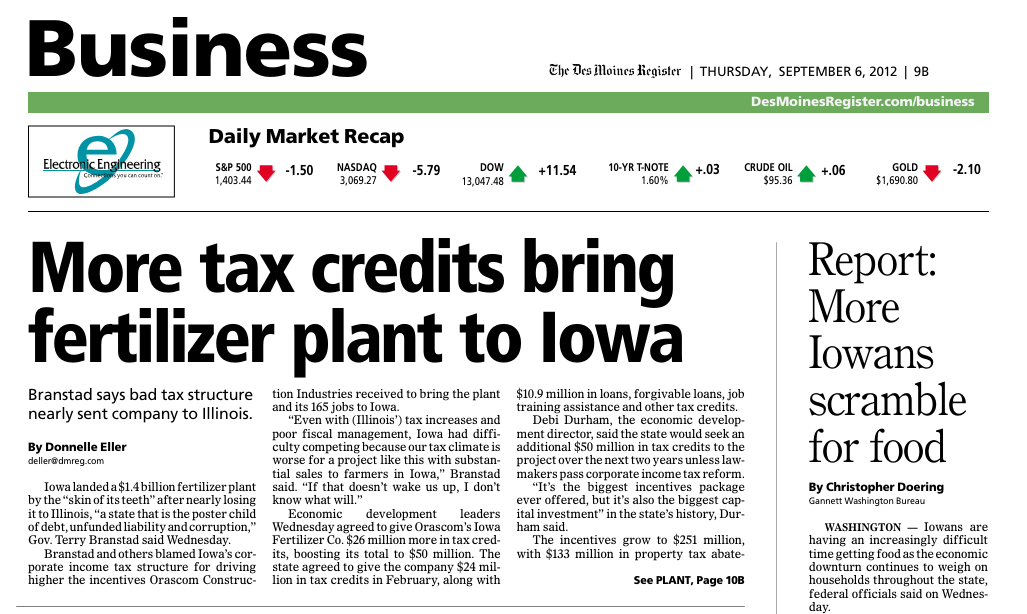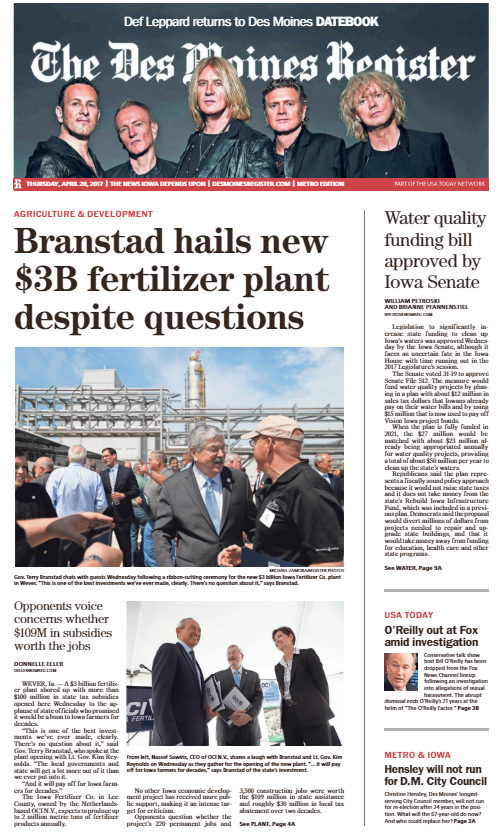With its $240 million fertilizer gamble in peril, Iowa should give up on giveaways
A quarter billion dollars just doesn’t go as far as you’d think.
The most favorable package of tax and other incentives in Iowa history helped get an Egyptian company, Orascom, to agree in 2012 to build a gigantic nitrogen fertilizer production plant in Lee County. (The tally was about $240 million of state and local investment, going up to $550 million when including federal incentives, much of which were meant for flood recovery.) Part of the sales pitch was that Iowa Fertilizer would be a long-term bulwark against consolidation in the fertilizer industry and the resulting higher prices for Iowa farmers.
"This is one of the best investments we've ever made, clearly," Gov. Terry Branstad crowed when the plant opened in 2017. "And it will pay off for Iowa farmers for decades."
Wrong and wrong. In December, OCI, the Dutch spinoff from Orascom that operates the plant, announced the $3.6 billion sale, pending regulatory approval, of Iowa Fertilizer to Koch Fertilizer, one of four companies that control 75% of the U.S. fertilizer market.
Unless antitrust authorities intervene, our local competitor made it just seven years before the benefit of those subsidies could be transferred to the behemoth they were supposed to be resisting.
The Federal Trade Commission has an important job to do evaluating the sale. But the more important and more lasting takeaway from this for Iowans should be to exercise far more skepticism in the first place before handing out huge incentive packages to lure individual businesses.

What is the history of Iowa Fertilizer?
The handouts did succeed in creating a lot of temporary jobs and a lot fewer permanent jobs which would remain in Iowa under new plant ownership. But the competition element was more important. Iowa didn’t want a company like Koch dictating prices to the state’s farmers.
Orascom played Iowa against Illinois for months, extracting bigger promises from both states before deciding to build the fertilizer plant near Wever in southeast Iowa. The scheme had blunt critics from the start, including such figures as Grover Norquist of Americans for Tax Reform. Opponents remained loud as the construction timeline dragged on and taxpayer investment grew for years, with the plant starting operation in 2017, two years behind its original target. The sale news would seem to justify some bitter “I told you so”s.
Nasser Sawiris, the Egyptian chairman of OCI, visited Iowa several times for photo ops related to the plant, but it seems safe to say Forbes’ No. 273-ranked billionaire ($9.1 billion net worth) won’t be back after extracting what he could from us. “Today’s announcement marks an evolutionary step in our journey to create value for shareholders,” he began in a prepared OCI statement announcing the sale.

What are the implications of Iowa Fertilizer’s sale?
The sale news set off alarm bells in the agriculture community. Dozens of people came to a listening session in Story County last month with FTC chair Lina Khan.
LaVon Griffieon, who farms in Polk County, said that the ag giants that sell seed, equipment and chemicals are always the ones that benefit no matter what happens in the market: “Every time crop prices go up, their prices go up.”
The problem was summarized most succinctly by State Auditor Rob Sand in his letter to Khan: “Less than a decade later, OCI Global is cashing out, with Koch Industries seeking to reap the benefits by buying the plant. But the fact that it wouldn’t be owned by Koch was a justification for the massive commitment of tax dollars in the first place.”
Two quick caveats about what is not at stake here:
This isn’t a political question. The problem here is not Koch Fertilizer’s affiliation with notorious conservative political donors and brothers Charles Koch and the late David Koch. Antitrust concerns would exist if the buyer were CF Industries, Nutrien or Yara, too.
And while this editorial board recognizes drawbacks to nitrogen fertilizer and its role in enabling fencerow-to-fencerow planting and the defiling of our state’s water, a skewed market for the stuff isn’t a remedy for those issues.
What needs to happen next?

Iowa Fertilizer’s sale is, of course, not a fait accompli. Under Khan’s leadership, the FTC has been aggressive in regulating the tech sector, and the grounds for keeping this plant out of Koch’s hands seem plain.
In the longer term, decision makers should not let this cautionary tale fritter away from their minds the next time a shiny-object investor company decides to test what Iowans will contribute to its coffers. The headlines that trumpeted Iowa Fertilizer’s birth and the headlines about its sale should be taped side by side to laptop screens in economic development offices. Not just for whoever in state government is imagining terms for the next giveaway to a data center company, but in cities and counties around the state where officials are tempted to one-up each other in bidding wars that end up benefiting companies more than residents.
Iowa has focused myopically on tax rates and incentives in its economic development strategy, while neglecting excellence in public schools, regulations to protect the public, and steps to ensure communities are welcoming and offer ample recreational opportunities. That’s where Iowa can, and must, put its money and attention.
Lucas Grundmeier, on behalf of the Register editorial board
FURTHER READING:An Iowa fertilizer plant purchase spurs antitrust concerns
FURTHER READING:The return of the Koch brothers
This editorial is the opinion of the Des Moines Register's editorial board: Carol Hunter, executive editor; Lucas Grundmeier, opinion editor; and Richard Doak and Rox Laird, editorial board members.
Want more opinions? Read other perspectives with our free newsletter, follow us on Facebook or visit us at DesMoinesRegister.com/opinion. Respond to any opinion by submitting a Letter to the Editor at DesMoinesRegister.com/letters.
This article originally appeared on Des Moines Register: Iowa should give up on corporate giveaways after fertilizer debacle
